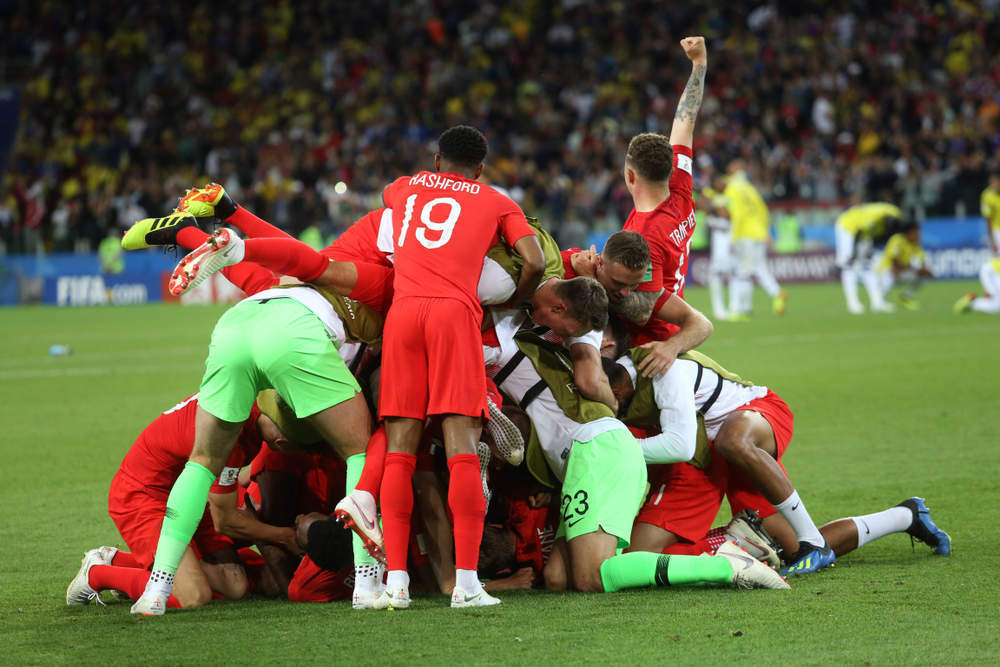
Penalty shootouts at major international tournaments have long been England’s undoing.
The long list of England’s penalty shootout defeats doesn’t make for good reading: defeat to Italy in the 2012 European Championship and defeats to Portugal in both the 2004 Euros and 2006 World Cup.
Before that, England crashed out on penalties against Argentina in the 1998 World Cup, and lost to Germany in Euro 96 with current boss Gareth Southgate’s effort famously saved. Then there was that agonising shootout defeat to West Germany in the semi-finals of the 1990 World Cup that left England fans dreading shootouts for the three decades that followed.
The moment that David Ospina saved Jordan Henderson’s spot-kick to give Colombia the advantage in the fight for a place in the last eight, many England fans undoubtedly felt a sense of dread at what was about to come. England had been here many times before, and the outcome was always the same.
However, Mateus Uribe’s shot cannoned off of the crossbar was the start of the end for Colombia and the first sign that England’s penalty shootout fortunes were about to change. Kieran Trippier kept his cool to level it up, before England keeper Jordan Pickford saved Carlos Bacca’s kick to put England one penalty away from their first penalty shootout victory in almost 100 years of World Cup history.
Victory still required a calm head – something that England has often lacked in the face of pressure. However, Eric Dier stepped up to send England through and resume the nation’s chants of “it’s coming home” that Yerry Mina had silenced 30 minutes earlier.
How well do you really know your competitors?
Access the most comprehensive Company Profiles on the market, powered by GlobalData. Save hours of research. Gain competitive edge.

Thank you!
Your download email will arrive shortly
Not ready to buy yet? Download a free sample
We are confident about the unique quality of our Company Profiles. However, we want you to make the most beneficial decision for your business, so we offer a free sample that you can download by submitting the below form
By GlobalDataHow England finally prevailed in a penalty shootout
Fans were fearing the worst, but England’s young squad were able to prove their doubters wrong by keeping their cool to prevail on penalties.
The side overcame their biggest stumbling block in the England vs Colombia penalty shootout, but how has Southgate changed the England camp and with it the nation’s fortunes?
Psychological help
England’s lack of mental toughness showed at the 2016 European Championship.
Drawn against Iceland in the Round of 16, England were handed a seemingly easy passage to the quarter-final stage. However, despite taking an early lead through a Wayne Rooney penalty, an immediate response from Ragnar Sigurdsson saw England crumble. Kolbeinn Sigthorsson put Iceland ahead after 18 minutes and, with England out of fight, they crashed out to a team whose manager is a dentist by day.
There were signs of more of the same yesterday evening after Colombia’s last-ditch equaliser. However, they showed mental strength to get through extra-time, despite the disappointment of conceding right at the death.
At the very least, there was a noticeable improvement on that defeat two years ago, which could be attributed to Southgate’s decision to bring in a full-time psychologist to work with his squad at major tournaments.
England had been using the expertise of Dr Steve Peters, the psychiatrist best known for helping Great Britain’s athletes through the 2012 Olympics. However, ahead of the World Cup, Southgate brought in a team of four to five psychologists to travel to Russia and support the team throughout the tournament. The team is headed up by Pippa Grange, a former basketball player and experienced psychologist who has worked with sports clubs and organisations at the highest level.
The Football Association has tasked Grange with improving the psychological resilience of England’s 16 men and women national teams.
With victories at the U-17 and U-20 World Cup, as well as England’s latest feat at the World Cup, so far it seems to be doing the trick.
Preparing for the worst
There is likely always a big focus on penalties in the England camp heading into international tournaments, but Southgate started his preparations particularly early.
Ahead of the Colombia game, Southgate revealed that his side had been practicing from the spot since as early as March, three months before the tournament began.
Southgate said:
“In terms of penalties, we’ve been practising and going through strategies on them since March.
“We’ve done various different studies and had individual practice. We’ll obviously go through that in a little more detail now, but it would have been too late to start that now, three days away from a game.
“We have got to be prepared physically to go to extra-time if needed, mentally to go to extra-time – and to go beyond that if that’s what it takes.”
That has been evident throughout the tournament, with Harry Kane scoring three of his six goals from the spot. Likewise, seeing the likes of Trippier, who has never had the opportunity to step up to the spot, put one away shows just how much has gone into preparing for this situation.
Fewer caps, more experience?
England have always looked like they lacked the experience to deal with the big occasions.
That is largely because they have. While players like Steven Gerrard and Frank Lampard had an abundance of quality, they didn’t have the tournament experience on the international stage to back it up. Gerrard, for example, made just four appearances for England’s youth teams before making the step up to the senior squad. Lampard made 20 appearances, but these were all for the U-21s and B-sides.
In comparison, Kane and Raheem Sterling, England’s front two on Tuesday, made 34 youth appearances for England each.
Pickford has represented England 57 times, with 50 appearances from various youth teams. During his time at youth level, Pickford has competed in World Cups and European Championships. This has undoubtedly provided him with plenty of experience to call upon.
This is the first England World Cup squad to have fewer than 500 caps between the 23 players since 1998. Each player has played approximately 21 games for the senior side, compared to approximately 29 games in the 2014 World Cup and 36 games at the 2010 tournament.
Likewise, this is also the first to have more than 500 youth caps between them in England’s recent history. Each player has an additional 22 youth games worth of experience, compared to approximately ten youth games in 1998.
While at a lower level, these players have faced the biggest teams in the highest-profile games for the most prestigious trophies at youth level. Ruben Loftus-Cheek scored the winner to help England to the 2016 Toulon Tournament trophy. Pickford was in goal on that occasion too.
It’s impossible to say that a well-oiled youth system is making the difference, but experience, particularly tournament experience, can’t have done them any harm.






